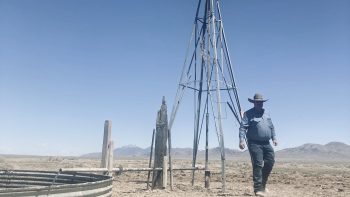What’s in the cards for our economy?
TEXT OF INTERVIEW
Kai Ryssdal: 3M and McDonald’s aren’t the most likely of corporate bedfellows. But they made similar news this morning. Both said problems in Europe — specifically the falling euro, which makes what they sell more expensive over there — is going to hit them right in the bottom lines. You roll Europe’s debt crisis up with the weak jobs report we had here on Friday, and there is some speculation about a most unwelcome economic possibility: a double-dip recession.
To test the theory, we’ve called economist Brad DeLong at the University of California, Berkeley. It’s good to have you with us.
Brad DeLong: I’m very happy to be here, even though I do have a chest cold.
Ryssdal: We appreciate you making the effort. So Ben Bernanke said last night he doesn’t really think there’s going to be a double-dip recession. But I think if you walked out on the street and asked 10 people who walked by, they would say, “I’m not feeling so good these days.” What’s your take?
DeLong: Well, Ben Bernanke would say he isn’t feeling so good these days. If I recall, he also said that the economy wasn’t going to be very happy for quite some time to come. I think that Bernanke has his pulse on what’s going on and that he’s broadly right in terms of what the balance of the probabilities are. I would give you a 20 percent chance of a nice rapid recovery, the kind that makes people say it’s morning in America. A 20 percent chance of a double-dip recession, and a 60 percent chance of the economy bumping along with unemployment probably above 9 percent and certainly above 8 percent for quite a while to go. A so-called “jobless recovery” — that’s what’s probably on the cards for us.
Ryssdal: I had somebody say to me the other day in a conversation, “bumping along a muddy bottom” and that we can’t really see what’s coming. We don’t really know what’s going on.
DeLong: What’s coming is that the economy is going to grow, but not grow fast enough to pull a great many of the unemployed — particularly the long-term unemployed — back into employment any time very soon.
Ryssdal: What about the problems coming out of Europe though? I mean, for goodness’ sake, we have to be worried about the Hungarian economy now?
DeLong: No, we don’t have to be worried about the Hungarian economy. The Germans have to be worried about the Hungarian economy. It’s only if the Germans and the French and the British bobble the situation and the German and French and British economies get into big trouble, that we then have to worry about what’s going on in Europe.
Ryssdal: Well, how are they doing so far?
DeLong: They’ve acted quite responsibly. They recognized that they’re the dominant economic players in Europe, and so that they have a responsibility for trying to keep the entire European economy as healthy as possible.
Ryssdal: So to de-quantify it, if I could, would you say you are calm and anticipating not-so-bad things or are you a little nervous?
DeLong: Well, I’m very nervous, but that’s because I think a jobless recovery is a bad place to be in. We ought to have the unemployment rate bumping around between 4 and 5 percent in the United States these days, given the experience of our work force and the structure of our economy. To have it stuck up above 9 percent for any considerable length of time, that’s an absolutely horrible place to be.
Ryssdal: Brad DeLong, professor of economics at the University of California, Berkeley. Professor, thanks very much for your time.
DeLong: You’re very welcome.
There’s a lot happening in the world. Through it all, Marketplace is here for you.
You rely on Marketplace to break down the world’s events and tell you how it affects you in a fact-based, approachable way. We rely on your financial support to keep making that possible.
Your donation today powers the independent journalism that you rely on. For just $5/month, you can help sustain Marketplace so we can keep reporting on the things that matter to you.


















